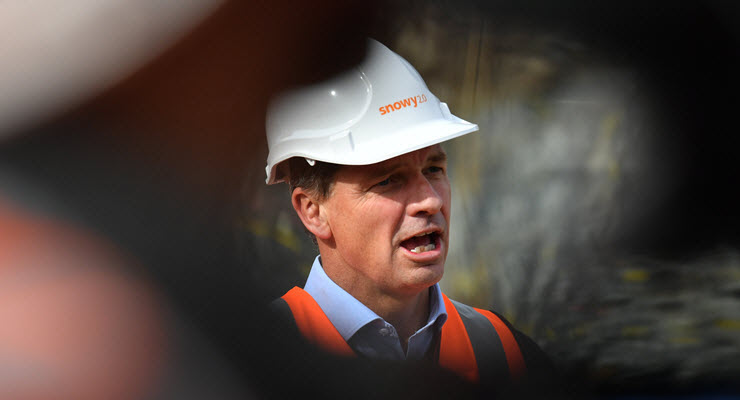
Evidently alarmed by the growing focus on the government’s proposed “CoalKeeper” tax on households to prop up unviable fossil fuel generators, Angus Taylor and his media and industry backers have rushed to defend directing billions in subsidies to fossil fuel companies.
Taylor got himself asked a Dixer in question time yesterday and used it to insist CoalKeeper would be about “gas and pumped hydro”, and that other countries had similar mechanisms. Energy Security Board head Kerry Schott — who oversaw the $1 million sale of NSW’s coal-fired Vales Point power station to Trevor St Baker’s Delta Energy — claimed CoalKeeper wouldn’t prolong the lives of coal-fired power stations for a minute.
And the Financial Review editorialised that CoalKeeper wasn’t about protecting coal, but “if it is designed well, should not protect coal generation from the immense pressure it is under to exit” — though at least it acknowledged the obvious, that “the plan could cost more”.
The Fin also ran an op-ed by former Minerals Council executive and News Corp journalist Matthew Warren, who now heads the industry lobby group for most of the major fossil fuel generators, the Australian Energy Council. Warren argued “the devil remains in the detail, in particular how the anchoring coal-fired generators would be treated under a such a reform”.
The argument from CoalKeeper advocates boils down to “trust the government not to use this to prop up coal”.
The problem is we know the government can’t be trusted. As Crikey explained yesterday, fossil fuel representatives have a stranglehold on the policy process within the government and to the government via external inputs, as well as being some of the biggest donors to the Coalition.
We know that one of the biggest topics of Scott Morrison’s regular lies and falsehoods is climate and energy policy. We know that the National Party is committed to expanding coal-fired power with taxpayer funding. We know that the government is committed to a taxpayer-funded “gas-led recovery”. We know that the government remains wedded to hopelessly inadequate 2030 emissions reduction targets. And we even know that forged documents are used by Angus Taylor’s office.
Knowing all that, who could credibly suggest the government can be trusted to observe a technology-agnostic policy process in developing a so-called reliability obligation? Every decision the government has made on energy — from backing gas, to changing its Emissions Reduction Fund, to handing out money for scoping studies for coal-fired power stations — has been designed to serve the interests of the fossil fuel industry.
Now we’re being asked to believe that CoalKeeper, and the possibility of each household paying $400 a year to support greenhouse emissions, will be different.








Whatever the boondoggle, NSW will benefit from most of the Australian taxpayer funded expenditures…..a gas fired power station perhaps.
Snowy 2.0, Badgerys Creek, Brisbane – Melbourne heavy rail, through the entire state of NSW will, overwhelmingly benefit NSW contractors and subcontractors with wealth trickledown throughout the nearby regional towns.
ABV (anywhere but Victoria), of course doesn’t apply in these circumstances when the Canberra public service bubble was considering these proposals, but I have no doubt that high speed rail Canb-Sydney-Newcastle is being worked on right now…..of course they’ll call it nation building.
Will these endless scams ever be seen for what they are.
Now there is a man who belongs in jail
“Taylored tax – subsidising Coalition donors.”
…. “CoalKeepr – a Taylored tax – subsidising Coal-ition donors”.
Is Taylor amoral or immoral – and is that why he’s such an integral part of this corrupt farrago of a government.
LNP communism
subsidising dud industries for politics
the LNP have arrived at their altar
Congratulations comrades
Like all of his colleagues, he’s corrupt.
Take your pick; a very worthy question, regardless of the answer.
Is Qantas a donor ?
Is it a shareholder owned company….of the ‘too big to fail’ variety ?
Totally.
Amidst all the mendacity, support for the fossil fuel industry is about the only thing on which the government (and ersatz national party member Fitzgibbon) have shown consistency.
And besides Angus is involved…
Golly gosh, this sounds remarkably like a carbon tax. Tony Abbott is surely apoplectic….?
Another carbon tax from the EU is waiting in the wings too.
Peta Crudlin and her Queen’s Birthday honours bestowed because of her services to the fossil fuel industry primarily for the lie that she admitted to , making up that Labor’s carbon price was a carbon tax, which enabled her to control the narrative and have her little puppet Abbott elected.
Wouldn’t support the car manufacturing industry, wouldn’t support local wind turbine or PV panel manufacturing. Hundreds of thousands jobs lost! Forget about doing anything about climate change or housing or dental care. And even when they do pretend to care, as in COVID, they go cap in hand begging other countries to manufacture enough to cover us and third world countries be damned! BUT the moment their precious fossil fuel donors get in the slightest bit of trouble, never mind the hundreds of billions in profits they’ve raked in over the years, this govt will bend over backwards for them, including now this reverse carbon tax. Now I don’t really don’t expect anything different from LNP, but it’s still a shock when Labor, the supposed ‘people’s party’ let’s them get away with it. Constantly!
A friend arekkz those wind turbines and the lot that were set up near Ararat have not spun a blade they are not connected to a transmission line and furthermore they cannot be used because the welds are cracking they were made in China I kid you not.
And the company responsible for erecting them run it by and Irish national who is laughing tax-free all the way back home